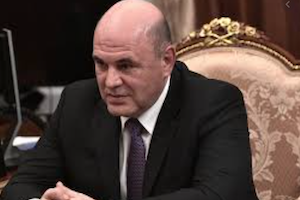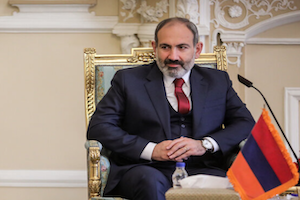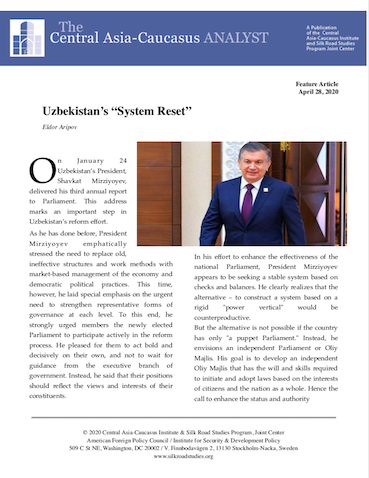Chechnya's Kadyrov Clashes with Russian PM Mishustin
By Emil A. Souleimanov and Huseyn Aliyev
June 10, 2020, the CACI Analyst
At an April 6 ministerial meeting, Russia’s newly appointed Prime Minister Mikhail Mishustin made a remark to the governors of Russia’s provinces, who in the preceding weeks introduced a ban on leaving and entering their respective regions in order to curb covid-19 infections, advising them “not to confuse regional powers with federal authorities.” As Chechnya’s strongman Ramzan Kadyrov had introduced a ban on the republic’s physical contacts with the outside world in the end of March, Kadyrov took this general statement personally. Soon, Kadyrov expressed concern that the prime minister was being “misled.” The conflict marks what some believe is the beginning of a troublesome relationship between Chechnya’s leader and Russia’s newly appointed prime minister.

Uzbekistan's "System Reset"
Uzbekistan's "System Reset"
By: Eldor Aripov
On January 24 Uzbekistan’s President, Shavkat Mirziyoyev, delivered his third annual report to Parliament. This address marks an important step in Uzbekistan’s reform effort.
As he has done before, President Mirziyoyev emphatically stressed the need to replace old, ineffective structures and work methods with market-based management of the economy and democratic political practices. This time, however, he laid special emphasis on the urgent need to strengthen representative forms of governance at each level. To this end, he strongly urged members the newly elected Parliament to participate actively in the reform process. He pleased for them to act bold and decisively on their own, and not to wait for guidance from the executive branch
of government. Instead, he said that their positions should reflect the views and interests of their constituents.
In his effort to enhance the effectiveness of the national Parliament, President Mirziyoyev appears to be seeking a stable system based on checks and balances. He clearly realizes that the alternative – to construct a system based on a rigid "power vertical" would be counterproductive.
But the alternative is not possible if the country has only "a puppet Parliament." Instead, he envisions an independent Parliament or Oliy Majlis. His goal is to develop an independent Oliy Majlis that has the will and skills required to initiate and adopt laws based on the interests of citizens and the nation as a whole. Hence the call to enhance the status and authority
of parliamentarians. To this end, also, he sharply broke with tradition by proposing a law that will oblige ministers to respond personally to requests from members of parliament.
Iran's COVID-19 and Pakistan's Vulnerability
By Umair Jamal
April 13, 2020, the CACI Analyst
Pakistan’s Corona virus cases have doubled over the past few days after hundreds of pilgrims returning from Iran tested positive. In response to the Pakistani government’s attempt to impose a lockdown on thousands of Shias at the Iran-Pakistan border, the community has vowed to start a mass movement against the state. Pakistan’s Iran border has become its single biggest security threat with regional and global implications. Given that Pakistan is a nuclear-armed state with a weakening economy, a weak health care system, a controversial regional security policy and a blooming militant landscape, the region and the world at large should follow developments in the country closely.

Armenia's Post-Revolutionary Government Seeks to Speed up Reform
By Armen Grigoryan
January 21, 2020, the CACI Analyst
A year after winning a two-thirds majority at the snap parliamentary elections, Armenia’s Prime Minister Nikol Pashinyan has acknowledged flaws in the government’s previous approach to the reform process, admitting that some essential reforms have practically been stalled. Pashinyan continually enjoys a considerably high level of public support, and needs to take decisive steps towards more drastic reforms, possibly by mobilizing support from different groups that welcomed the “Velvet Revolution” and the wider expert community.

New Wave of Anti-Government Protests in Georgia
By Natalia Konarzewska
December 16, 2019, the CACI Analyst
Before the dust from the June anti-government demonstrations had time to settle, Georgia saw a new round of protests in November. This time, Georgians took the streets after the ruling Georgian Dream (GD) party declined to reform the electoral system despite earlier promises. A majority of Georgians support switching from a mixed to a fully proportional electoral system before the 2020 parliamentary elections, since this will break the ruling party’s electoral domination and ensure a fairer parliamentary representation for small parties. GD proposed electoral reform in June to meet opposition demands, however, in November the ruling party surprisingly backed away from the idea after failing to collect the essential number of votes among its deputies to pass the constitutional amendment.




